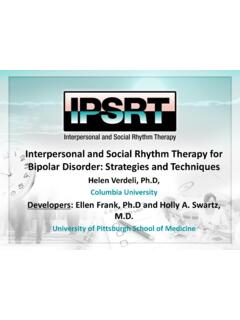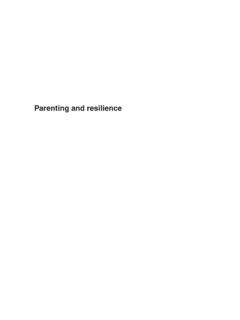Transcription of Adult Needs and Strengths Assessment
1 712011(2) Adult Needs and Strengths Assessment ANSA Manual An Information Integration Tool for adults with Behavioral Health Challenges Version Copyright, 1999 The Copyright for the ANSA Information Integration Tool is held by the Praed Foundation to ensure that it remains an open tool, free for anyone to use. Information on guidelines for use and development can be obtained by contacting the foundation at 712011(2) 2 A large number of individuals have collaborated in the development of the ANSA. The ANSA is an open domain tool for use in service delivery systems that address the mental health of adults and their families.
2 The copyright is held by the Buddin Praed Foundation to ensure that it remains free to use. For specific permission to use, please contact Melanie Lewis of the Foundation. For more information on the ANSA Assessment tool contact : John S. Lyons, Endowed Chair of Child & Youth Mental Health Research University of Ottawa Children's Hospital of Eastern Ontario 401 Smyth Road, R1118 Ottawa, ON Canada 613-562-5800 X8701 Betty Walton, Family Social Services Administration Division of Mental Health and Addiction Indianapolis, IN Along with the ANSA, versions for children and adolescents have been developed.
3 These tools include the Child and Adolescent Needs and Strengths -Mental Health (CANS-MH), the Individual and Adolescents Needs and Strengths -Developmental Disability (CANS-DD), the Child and Adolescent Needs and Strengths -Juvenile Justice (CANS-JJ), and the Child and Adolescent Needs and Strengths -Sexual Development (CANS-SD). A comprehensive multisystem version of the CANS has also been developed. These information integration tools have been designed to support individual case planning and the planning and evaluation of service systems. For more information on any of the tools for children and adolescents contact : Praed Foundation 712011(2) 3 Introduction When the ANSA is administered, each of the dimensions is rated on its own 4-point scale after the initial intake interview, routine service contact , or following the review of a case file.
4 Even though each dimension has a numerical ranking, the ANSA Assessment tool is designed to provide a profile of the Needs and Strengths of the individual and family. It is a reliable aid to the service planning process and allows for the monitoring of outcomes. The basic structure of the ANSA is: Life Domain Functioning Physical/Medical Family Employment Social Functioning Recreational Intellectual Sexuality Living Skills Residential Stability Legal Sleep Self Care Decision Making Involvement in Recovery Transportation Medication Involvement Strengths Family Social Connections Optimism Talents/Interests Educational Volunteering Job History Spiritual/Religious Community Connectedness Natural Supports Resiliency Resourcefulness Acculturation Language Identity Ritual Cultural Stress Behavioral Health Needs Psychosis Impulse Control
5 Depression Anxiety Interpersonal Problems Antisocial Behavior Adjustment to Trauma Anger Control Substance Use Eating Disturbance Risk Behaviors Danger to Self/Others Self Injurious Behavior Other Self Harm Exploitation Gambling Sexual Aggression Criminal Behavior Caregiver Strengths and Needs (optional) Physical/Behavioral Health Involvement Knowledge Social Resources Family Stress Safety 712011(2) 1 Unless otherwise specified, each rating is based on the last 30 days. Each of the dimensions is rated on a 4-point scale after routine service contact or following review of case files.
6 The basic design for rating Needs A 0 indicates no evidence, no need for action, A 1 indicates a need for watchful waiting to see whether action is needed ( , flag it for later review to see if any circumstances change or refer for Assessment ), A 2 indicates a need for action, and A 3 indicates a dangerous or disabling need or the need for either immediate or intensive action. The basic design for rating Strengths A rating of 0 reflects a significant strength that is present, A rating of 1 reflects that a moderate level of the strength is present, A rating of 2 reflects that a mild level of the strength is present, and A rating of 3 reflects that the strength is not present.
7 For Strengths , a rating of 0 or 1 reflects a strength that can be used to build around, while a rating of 2 or 3 reflects a strength that Needs to be developed or identified. The rating of NA for not applicable should be use with cases in the rare instances where an item does not apply to that particular client. The rating of U for unknown can be considered a flag for a need to find this information for a complete profile or picture of the Needs and Strengths of the individual and their family. The ANSA is an effective Assessment tool for used in either the development of individual plans of care or for use in designing and planning systems of care for adults with behavioral health (mental health or substance use) challenges.
8 To administer the ANSA Assessment tool found at the end of this manual, the care coordinator or other service provider should read the anchor descriptions for each dimension and then record the appropriate rating on the ANSA Assessment form. One ANSA Assessment tool is completed for each case reviewed. 712011(2) 4 Coding Criteria LIFE DOMAIN FUNCTIONING PHYSICAL/MEDICAL This rating includes both health problems and chronic/acute physical conditions. 0 There is no evidence of physical or medical problems. 1 Mild or well-managed physical or medical problems are indicated.
9 This might include well-managed chronic conditions like diabetes or asthma. A person in need of a physical/medical examination would be rated here. 2 Chronic physical or moderate medical problems are present. 3 Severe, life threatening physical or medical condition exists. FAMILY FUNCTIONING The definition of family should be from the perspective of the individual ( , who does the individual consider to be family). Family functioning should be rated independently of the problems experienced or stimulated by the individual currently assessed. 0 No evidence of family problems is identified.
10 1 A mild to moderate level of family problems including marital difficulties and problems between siblings is indicated. 2 A significant level of family problems exists, such as frequent arguments, difficult separation and/or divorce , and siblings with significant mental health, developmental or criminal justice problems. 3 A profound level of family disruption including significant criminality or domestic violence is indicated. EMPLOYMENT This rates the performance of the individual in work settings. This performance can include issues of behavior, attendance or productivity.




